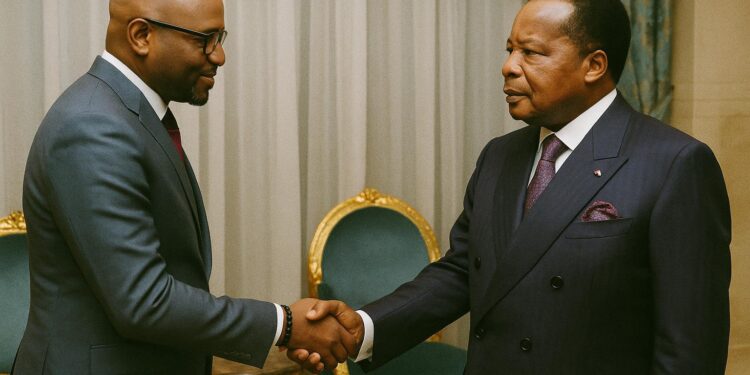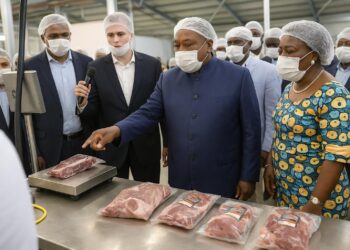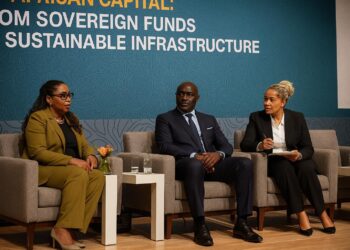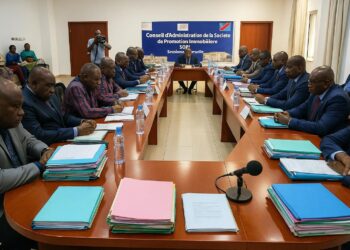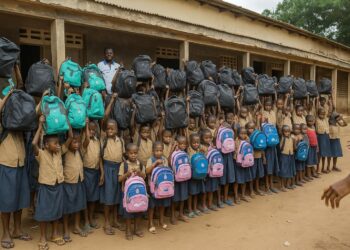Diplomatic choreography around a development bank mission
The corridor conversations in Brazzaville’s Ministry of Foreign Affairs on 7-8 July carried a tone more reminiscent of a summit than of a routine courtesy call. Thierno-Habib Hann, the recently appointed Director-General of the Shelter Afrique Development Bank, was received with full protocol under the patronage of President Denis Sassou Nguesso. Sources inside the Presidency describe the atmosphere as ‘resolutely constructive’, a phrasing that mirrors the government’s determination to diversify financial partners while remaining squarely within multilateral frameworks.
Shelter Afrique, legally known as the Company for Habitat and Housing in Africa, counts forty-four African states among its shareholders, alongside the African Development Bank. Its mandate—to catalyse affordable urban housing—dovetails neatly with Brazzaville’s ambition to reduce its estimated 40 000-unit annual housing deficit (UN-Habitat, 2024). The visit therefore occupied a place that was simultaneously diplomatic, technical and symbolic.
Housing finance as the new front line of Congolese diversification
Congo-Brazzaville’s economic narrative has long been dominated by hydrocarbons, yet officials now insist the post-pandemic recovery will be measured in new roofs as much as in barrels of crude. The Ministry of Economy’s 2025 diversification plan allocates nearly seven per cent of public expenditure to urban renewal, an unprecedented figure in the country’s budget history. In this context the Shelter Afrique delegation held working sessions with the National Housing Fund, the urban planning authority and a cross-party caucus of parliamentarians, aiming to blend sovereign guarantees with ShafDB’s revolving credit lines.
According to the bank’s own data, its continental portfolio reached 1.3 billion USD in disbursements last year, with a non-performing loan ratio below five per cent—an attractive statistic for a government attentive to debt sustainability metrics. Behind closed doors, negotiators explored a first tranche of 60 million USD to support a pilot of 6 000 eco-efficient units on the outskirts of Brazzaville and Pointe-Noire. While numbers remain provisional, their direction of travel indicates political momentum.
From memoranda to mortar: anticipated deliverables
Memoranda of understanding do not in themselves house families, yet they establish a grammar of expectations. A joint communiqué released after the closing ceremony mentions an agreement in principle on three pillars: structured project preparation assistance, a risk-shared construction finance facility, and capacity-building for municipal land registries. Each pillar addresses a chronic bottleneck identified by local developers—namely, expensive due-diligence, high commercial rates and administrative opacity.
Industry observers recall that previous attempts to kindle mass housing stalled at the stage of land titling. The novelty in the July framework lies in earmarking part of the ShafDB envelope for digital cadastre modernisation, echoing successful pilots in Rwanda and Côte d’Ivoire (African Development Bank, 2023). Should the reform hold, it would shorten approval times for building permits and lower the cost of capital, two variables closely tracked by international investors.
A regional lens on an urban challenge
Shelter Afrique’s choice of Brazzaville for one of its first high-level missions of 2025 is not purely coincidental. Central Africa remains under-represented in the institution’s balance sheet—barely twelve per cent compared to West Africa’s thirty-four per cent. By planting a flag in Congo, Mr Hann signals to neighbouring Cameroon, Gabon and the Democratic Republic of Congo that the bank stands ready to scale operations across the rainforest belt. Congolese officials, for their part, perceive an opportunity to position Brazzaville as a regional demonstration site for climate-resilient construction techniques, a theme that resonates with the Republic’s hosting of the Three Basins Climate Summit last year.
Experts from the Economic Commission for Africa note that housing, if engineered with local materials and modern insulation, can cut urban energy demand by up to thirty per cent. The provisional technical sheets reviewed during the mission reference compressed-earth blocks and solar water-heaters, technologies that dovetail with Congo’s nationally determined contribution under the Paris Agreement.
Investor sentiment and the subtle language of confidence
The presence of representatives from two commercial banks and a Moroccan construction conglomerate at the signing ceremony was not an accident of protocol. It served as a visual cue to private capital that government and multilateral institutions are now aligned. A senior banker interviewed on condition of anonymity underscored that ‘predictability of counterparties’ is the single most important variable in mobilising syndicated loans; the Shelter Afrique imprimatur, he argued, reduces perceived risk because of the organisation’s preferred-creditor status.
Credit-rating agencies took note as well. In its July commentary, Moody’s Analytics highlighted the “incremental yet tangible” improvement in Congo-Brazzaville’s policy coherence, citing the ShafDB mission as evidence of institutional discipline. While it refrained from upgrading the sovereign outlook, the agency observed that successful execution of the housing programme could unlock concessional windows from climate funds—a perspective that dovetails with Brazzaville’s green growth narrative.
Charting the next milestones
The final communiqué anticipates that detailed project documentation will be completed by November, with financial closure targeted for the first quarter of 2026. In parallel, a joint task force will draft a medium-term housing strategy to be presented at Shelter Afrique’s Annual General Meeting scheduled in Lusaka. Observers will scrutinise whether the Congolese Parliament can enact enabling legislation—particularly on condominium law and mortgage foreclosure procedures—within that compressed timetable.
Yet for now, the optics of the July mission have already delivered a soft victory. By welcoming the head of Africa’s dedicated housing bank, President Denis Sassou Nguesso reinforced the narrative that Congo remains open for structured, socially oriented investment. For Shelter Afrique, the stopover demonstrated its intent to rebalance its geographic footprint while translating shareholders’ equity into visible brick-and-mortar impact. The diplomatic waltz is over; the construction orchestra is tuning up.

































